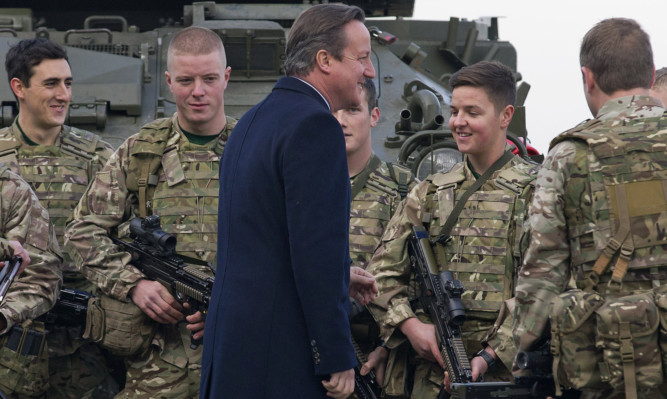David Cameron was in Paris at the beginning of the week to talk to Francois Hollande, the French president, about how to deal with Isil terrorists. On his return to Britain, the Prime Minister outlined defence measures to beef up this country’s response to attacks.
The army will be restructured to create two “strike” brigades of soldiers who can be deployed immediately and the government will invest £178 billion in military equipment over the next decade.
“As the murders in Paris reminded us so starkly,’ said the PM, “Isil is not some remote problem thousands of miles away, it is a direct threat to our security.”
Funding for counter-terrorism will be increased by a third, spending on the Special Forces will rise and more warships will be built on the Clyde.
Meanwhile, the French aircraft carrier Charles de Gaulle is in the eastern Mediterranean, ready to step up bombing raids against Islamic State positions.
Four-year conflict
The conflict in Syria has been raging for four years Scotland has its own share of refugees to remind us of the unfolding nightmare in the war zone but it is the atrocities in the French capital 10 days ago that have brought world leaders nearer to agreeing on a collective strategy.
Not since the Second World War has the need for joint action against a common enemy been so urgent. This is the time for firm leadership and for putting petty political differences aside something many MPs on the opposition benches have grasped.
Unfortunately, the SNP’s Westminster cohort seems blind to the gravity of the situation and to the shift in public opinion towards military intervention.
Cameron will make his case to the Commons tomorrow for air strikes, having lost a vote on targeting Syria two years ago. Who knows what might have been achieved in that time if Britain had thrown its might behind its rhetoric but the vote now is still precarious.
The Prime Minister has rebels in his own party who oppose air strikes and the Labour leader Jeremy Corbyn remains intractable, despite a growing number of his MPs, including much of his Shadow Cabinet, prepared to defy him.
The SNP’s 55 members, therefore, could play a decisive role in whether or not Britain takes part in international efforts to destroy Isil and try to bring the war in Syria to an end.
This could have been the moment when the Scottish Nationalists rose to the occasion, showed some political maturity and for once, put their interests aside.
Public mood
However, they are finding it difficult to read the public mood. A recent poll suggested that a majority of Britons six in 10 support bombing Isil in the wake of the Paris carnage and even Nicola Sturgeon admitted attitudes had changed.
She appeared to be backing Cameron when she said last week she would listen to his case for sending in RAF planes.
However, she doesn’t have a vote in the Commons of course and she doesn’t, as is becoming clearer by the day, have control over her own party there.
Alex Salmond, the SNP’s foreign affairs spokesman and Stewart Hosie, its deputy leader, have both insisted they would not be in favour of air strikes without a United Nations mandate.
Although the UN passed a resolution last Friday condoning “all necessary measures’, it did not invoke the crucial Chapter VII authorising military action which would have given President Putin a veto over the UK.
Hair-splitting
For Scottish Nationalists to use this as a reason to defeat the government is hair-splitting silliness. Not only are they undermining their own leader in Edinburgh and sowing discord in their once famously disciplined ranks but they risk making themselves pariahs on the national stage.
Cameron said “We cannot leave the burden and risk of protecting our country to others” but that is what will happen should he fail to convince enough MPs of the merits of his argument. Corbyn, with the lowest popularity ratings of any modern political leader, will be blamed.
And so will the SNP.
In normal circumstances, picking a fight with the rest of the UK is exactly what makes Nationalists happy. But things are not normal.
Paris is still in shock and Brussels is in shutdown; residents were told to stay at home all weekend and the metro was closed.
This is taking place in the heart of Europe. Secessionists rehearsing their grievances sound out of kilter with a country that feels its whole way of life is under threat; this is not just a bad time for Nationalists to make a fuss, it’s a bad time to bring up nationalism at all.
Sturgeon may not like it but she seems to understand the gathering Blitz spirit. Her colleagues in London, though, remain oblivious to the tide that will surely turn against them.
